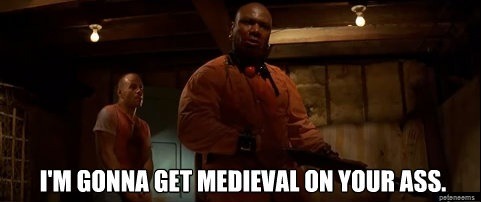You do not get to decide whether I should be offended by something you do or say; you only get to decide whether you care.I wrote about in the context of the Washington NFL obscenities, as well as Barilla's homophobic comments, the ethicist Chuck Klosterman's use of the word "retard," as well as Richard Cohen's attempt to make himself the victim because people got mad at his racism. It was a good blog post and a useful rule, I thought.
A caveat might apply as follows. If you think someone has fundamentally misunderstood, it's important to explain. For example, you might tell me that you actually were just saying ritardo, an Italian musical notation signifying a slowing down of the tempo (often at the end of a piece or a musical figure). But in general, my rule applies. If someone is offended, they are offended. You don't get to tell them not to be offended. All you get to do is decide whether you care.
I write this because I see far too many people reacting to offense - disability, gender, race, ethnicity, etc. - by claiming that the offended person is wrong to be offended. Then the apologies that follow are expressions that "I am sorry you were angry," not, "Forgive me, I did wrong." My own struggles in this arena tend to be around the use of words like retard, triso, and mong. But the general principle applies more broadly.
I am writing this today in the context of the #CancelColbert issue that emerged over the end of last week. Colbert's official account tweeted something offensive about Asians as a way of satirizing the Washington NFL team, its racist name, and the insensitivity of the owner. Colbert himself said it on his show live, but it was more offensive in the permanent space of the twittersphere, it seems.
My first reaction was dismissive. "Satire," I told myself, "and damn effective satire at that." But then I thought - what if he had said the Mongoloid Foundation for the Improvement of Disabled Americans, or something, I'd be pretty outraged. I have, in fact, gotten outraged when comedians have used people with Down syndrome and the intellectually disabled as a tool in their comedy.
Here's a thoughtful piece (more focused on hashtag activism) on the issue from The New Yorker:
I called Park on Friday to ask her about how #CancelColbert got started. She said she saw the offending tweet while eating dinner Thursday night and decided to respond to it. Despite her online profile—and the forceful, yet sometimes decidedly academic, tone of her advocacy—Park does not consider herself a “full-time” activist and claims that she does not particularly enjoy hustling along a hashtag. Her degree of involvement in a hashtagged cause, she said, depends on how much “free time” she has at the moment, and whether a particular issue piques her interest. “It’s not like I enjoy missing ‘Scandal’ to tweet about ‘The Colbert Report,’” she said.But really I just want to make this point.
If someone is offended by Colbert's remark, it doesn't necessarily mean that they don't get the joke. It means they were offended. You don't get to decide whether or not they should be offended. You only get to decide whether you care.

















